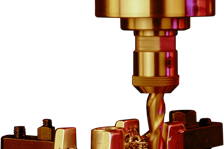news


VeritasCNC awarded prestigious National Science Foundation Small Business Innovative Research grant in smart machining!
Oct. 27, 2009: Stimulus Tax Dollars Supporting the Future of CNC Manufacturing
VeritasCNC Inc. (Portland, OR) announces the award of a National Science Foundation (NSF) Small Business Innovation Research (SBIR) grant to develop products that will fundamentally change the way parts are machined. Dr. Donald Esterling, CEO of VeritasCNC, pioneered the development and wide-spread commercialization of NC verification. VeritasCNC is developing similar disruptive productivity tools in collaboration with leading industry, university and government laboratories. The products are based on proven scientific principles that operate “under the hood” presenting the user with an easy to understand, machinist-friendly interface.
VeritasCNC offers automated tool wear prediction by integrating CNC control information with its science-based model. No more guessing on how long the tool will last. No more onerous training and experiments prior to final machining. Tool wear will be monitored and predicted from the very first tool cut, guided by science-based tool force computations. Tool wear is often ignored in optimization, but is a critical factor. Experimental tests by VeritasCNC and collaborators demonstrate that forces can double or more with a worn tool while the tool remains serviceable. This is similar to setting a car’s cruise control to 60 MPH when a safe speed (e.g. due to ice or road conditions) is 30 MPH … an accident waiting to happen. Prototype systems demonstrate that VeritasCNC products will be able to predict tool wear transparently and directly from the CNC data, not relying on often unreliable Taylor Law estimates.
About VeritasCNC VeritasCNC Inc. was founded to develop products that will fundamentally alter current manufacturing practice. Building on past success in geometric validation (NC verification), VeritasCNC is applying proven scientific models of the cutting process to assist manufacturers in selecting safe and optimal CNC cutting conditions. The research grant, totaling almost three quarters of a million dollars, was subjected to an intense technical and business review process. Less than 5% of the companies submitting initial applications receive NSF SBIR (Phase 2) funding.
